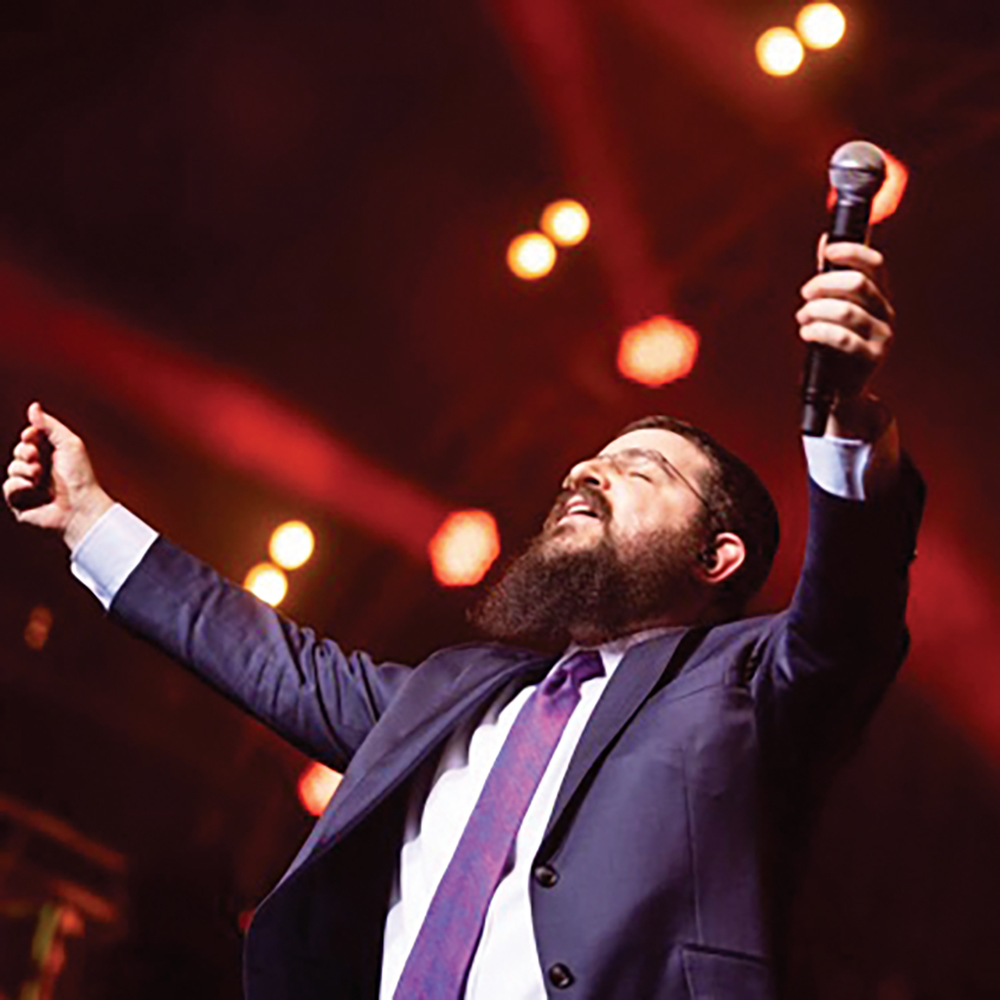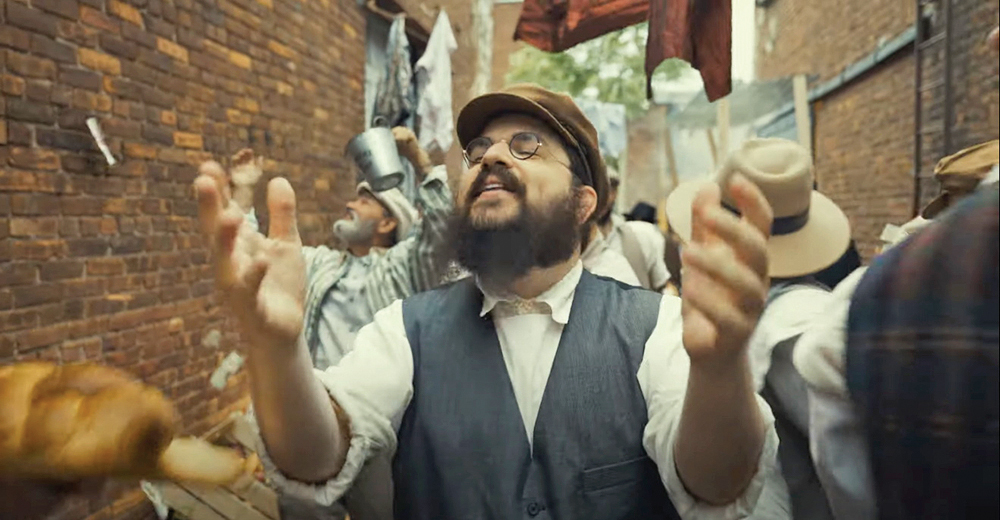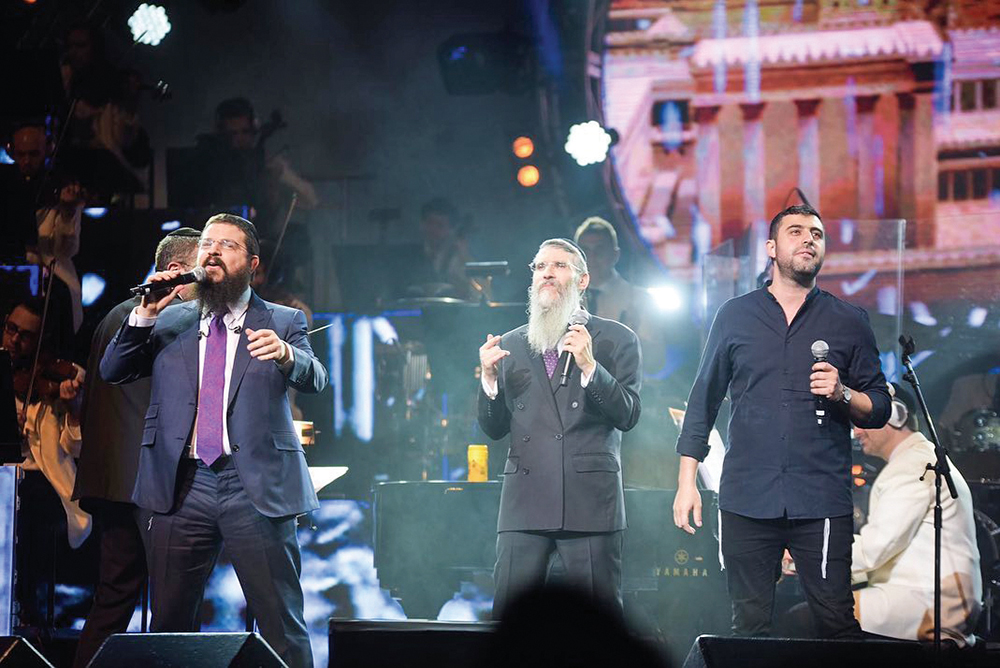
With multiple songs garnering tens of millions of views across various platforms, Benny Friedman has risen to become one of the most recognized and influential Orthodox singers in the world. Among his chart-toppers are iconic tracks like “Ivri Anochi,” “Yesh Tikvah,” “Toda!” and “Charasho.” He comes from a family of singers, including his uncle Avraham Fried and his first cousins Shmuel and Bentzi Marcus of the band 8th Day. Beyond his musical talent, Friedman received semicha and worked as a Chabad shaliach for several years in Tucson, Arizona. Friedman epitomizes the essence of spreading the love of Torah and Hashem, and it’s an honor to have him here with us at The Jewish Link.
Hi Benny! Thank you so much for taking the time to interview with us. Let’s start from the beginning. Can you please tell us about your background, where you’re from/went to school, and how you got involved in the music industry? Did growing up in a Chabad family play a role?
Thanks, Zack! Well, to start, I grew up in Minnesota. My parents are shluchim (Chabad “messengers” spreading Torah and wisdom), and life largely revolved around the ideas of shlichus. In my bachor years, during my yeshiva education, I had the opportunity to travel extensively, primarily within the United States but also to various parts of the world. These travels were always guided by the principles of shlichus in mind.
From early on, I had the idea of using music as a tool for shlichos. That’s really how I got started in music. During my time in yeshiva, I often found myself singing at various events, including weddings and gatherings. However, when I began my music career, it was primarily focused on Chabad house shows, and performances for Chabad house audiences. This involved singing a lot in English and performing songs that resonated with that specific setting, as opposed to mainstream Hasidic pop music. So, I would say that my roots in Chabad and the principles of shlichos had a significant impact on my early musical journey, which has ultimately shaped my career today.
Your debut album, “Tammu” marked a significant point in your career. Could you tell us about the inspiration behind this album and how it impacted your journey in the Orthodox pop music scene?

Absolutely. “Tammu” holds a special place in my career. It was my debut album, and it was a project that was particularly close to my heart. “Taamu” is the only one that I produced while I was still single. During this period, I had a lot of time and was deeply immersed in my love for music. I was constantly listening to a wide range of musical genres and exploring various creative ideas. I was in a whole music phase.
When it came time to make the album, it took a long time to do it—over two years. My philosophy was all about ideas, “Let’s try this, and let’s try that.’’ In a way, that album reflects that mindset. And my later albums, I didn’t have as much time. I wasn’t so immersed in the music, if that makes any sense.
The first album was very colorful and creative, it set the tone—very Hasidic. Behind any production, there has to be a song that still stands on its own, where you can just grab a guitar and sing it around the bonfire. It set the tone, for me, that I was trying to bring interesting, different music to a new generation of listeners.
Well, it certainly shows today with your music being as animated and lively as it is. I’ve been wondering, who are some of your musical influences, both within and outside the Jewish music world?
I would say my main musical influence is my uncle, Avraham Fried, and of course, Mordechai Ben David.
Right now the individual who I’ve been thinking about the most is a great hero of mine, Dedi Graucher, z”l. Dedi just passed away before Rosh Hashanah.
He was a dynamic, fun-filled, energy-filled, personality-filled ball of fire when he got on stage. It was electric. He’s a great inspiration to me and to all the people of my generation, for sure.
Dedi’s fearlessness, his unwavering dedication to ahavas Yisrael, and his ability to use his God-given talents to their fullest extent left an indelible mark on me. He was a real tzadik, selflessly serving others and spreading joy through his music. May we be zoche to reach a small percentage of what he accomplished. Unbelievable.
Thank you for sharing. Dedi was a real inspiration to a lot of people and will certainly be missed by all. Are there any specific themes or messages that you consistently explore in your music?
Yes, the themes that I try to explore in my music are based on the education that I received about the importance of ahavas Yisrael and the infinite value of each and every Jew. Further, it’s about recognizing the infinite love that Hashem has for His children and His desire for us to be close to Him and an integral part of His divine plan, Kiv’yachol.
Pride in being Jewish is another recurring theme in my music. These themes may seem basic, but they are timeless and can always benefit from fresh perspectives and support. Through my music, I strive to underscore the importance of our beliefs and values. I hope that this message is spread, and we support one another to be better Jews, and better people.

Can you please walk us through briefly the process of creating one of your masterpiece songs?
The process of creating each of my songs varies depending on how the song originates. At this point, basically, we have to either find the song or a song comes to us, BeHashgacha pratis. Once we have a song in mind, the next step is to determine the style in which we want to produce it. We then seek out the best producer available who can bring that style to life.
Before diving into the production, we begin by sitting in the studio with Donnie Gross to select the right key and tempo for the song. Afterward, we take the song for a spin and see if it works. Sometimes, even if you like a song, the song might not match you. So, we try it and if it works, we move ahead. And if it doesn’t, we move on.
Moving on to your career, in your mind, what has been your favorite concert that you’ve done? Similarly, do you have a favorite type of venue to perform in, whether it’s a camp, stage or theater?
It’s hard to choose my favorite one. I’ve had many memorable ones and some very geshmak ones. Any time that the sound system is working, the band is good, my voice is showing up, and the crowd is into it, those are the best. It’s a great miracle and a perfect, great gift from Hashem. And you come off the stage and you’re flying. And I thank God when that happens.
My favorite types of shows are really any time when that’s going on. A good crowd is the best help for a show.
My favorite concert of yours, for sure, was when you performed at Camp HASC when I was a counselor there in 2018. The energy and ruach that you brought was infectious. I know for HASC and other concerts, you often collaborate with other singers. Who is your favorite Jewish singer to perform with, and which singer that you haven’t sung with do you want to sing with?
There are really so many singers in our business that I really, really love. So, it’s hard to say. I mean, obviously, the collaborations that I have done with Baruch Levine and with Morty Shapiro and Ellie Marcus and 8th Day, etc, etc. I love these guys.
And there are many, many more in the business, people that I push with love. So really—I’m not sure who specifically, but there’s a big number of chevra that if the opportunity arose, I would jump at it.
Do you have a favorite song or project from your career so far, and if so, what makes it special to you?
I don’t have one specific project that I could say is my absolute favorite because I genuinely love a lot of the work I’ve done throughout my career, and each project has its own unique significance. However, if I had to pick one that stands out to me right now, it would be “Charasho.” It is very, very special to me. It took a lot of work, a labor of love for many years trying to get the right song and then get the right video.
“Charasho” is meaningful to me because of its lyrics, the fun and energy it exudes, and the message it carries. Moreover, I’m incredibly grateful for the positive impact it has had on people’s lives it has reached. I’m proud of what it has achieved.
By far your most-watched video on YouTube, “Ivri Anochi” has a whopping 26 million-plus views! Can you talk about that, and why do you think that one blew up the most?
“Ivri Anochi is not just my most popular song.” I think it’s the No. 1 most popular Jewish music video in the Hasidic pop music genre. While I can’t claim to have all the answers as to why it became such a hit, there are a few factors that likely contributed to its popularity.
First of all, it’s a great song—shoutout to Ari Goldwag, Miriam Israeli and Jamuli Marcus for helping there. Second, it’s a fantastic production—shoutout to Daniel Kapler and Jan Froeder. Third, it’s accompanied by an awesome music video—shout out to Mayer K and Shirley Meyer.
Those three things can combine for a hit project.
A possible key reason for its success could be its universal message of Jewish pride. “Ivri Anochi” resonates with Jews from all walks of life, emphasizing a sense of unity and identity. And it was done with a lot of love and it’s just a very fun song—I guess that’s what it takes.
I might not have the certain answer, but if somebody does know the answer, I’d love to know it so that we can replicate it!:)
Your last albums, “Whispers of the Heart 2 and 3” came out in 2020 and 2021, and this year in 2023 and featured some awesome hits. What can fans expect from your upcoming projects or releases?
The “Whispers of the Heart” series started spontaneously in the dark days of COVID when everybody was just sitting at home really looking for something to do. Donnie Gross reached out to me and said, “Hey, you’re not doing anything. I’m not doing anything. Let’s just do an a cappella album.”
Now, a cappella albums were not on my to-do list. But we figured, “Hey, we’re not doing anything else. So let’s just do it”. So, we went ahead and created those albums.
As for what fans can expect from my upcoming projects or releases, it’s a bit hard to predict. I don’t have a strict strategy in place. Instead, we take opportunities as they come, and whatever presents itself as the next obvious step, we will take it.
Just to add to that last one, included in the spirit of the “Whispers of the Heart” series, we also have an “It Sounds Like the Holiday” series. So, we have “It Sounds Like Chanukah” and “It Sounds Like Purim,” which were also spur-of-the-moment projects. I hope we’ll do more of those or more in that style, especially like the Purim one. I love picking a theme and just singing for an hour-and-a-half.
Since this is part of the Sukkot Activity Guide, what is your favorite Chol Hamoed Activity?
Anything that you can do with your children that they enjoy and that you enjoy is obviously a great miracle. We don’t have that much time in the Jewish entertainment industry to spend too much time with family on Chol Hamoed, which is one of the tragedies of being in this business, but that’s OK.
The greatest activity that I can recommend for Chol Hamoed Sukkos is to come out to Jewish music concerts. As musicians, we are sacrificing so much time and putting in a lot of effort. So please, come out and enjoy it! Hope to see you all there and Chag Sameach!
Benny Friedman will be performing at The Chol Hamoed Sukkos Riverside Experience alongside Avraham Fried, Moshe Tischler and Joey Newcomb. Showtimes are on Monday, October 2, at 2p.m. & 6:30p.m. at the Newark Symphony Hall. For tickets and more information, visit www.Sukkos2023.com.
Zachary Greenberg is a consultant at Semler Brossy and the TABC track coach. If you have any recommendations of fun places for him to cover, email [email protected].









